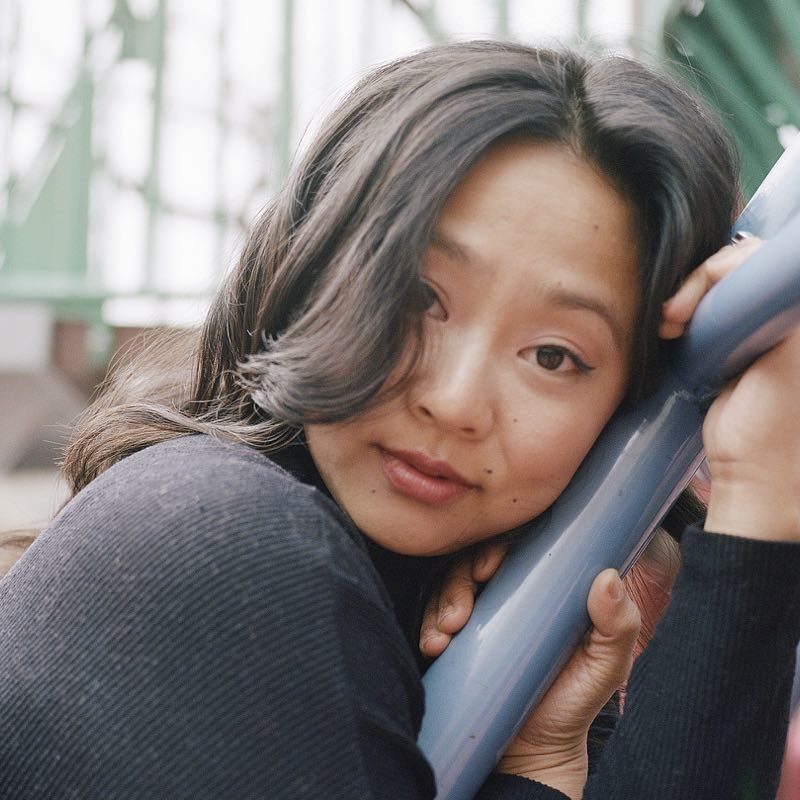Stephanie Hsu on Be More Chill and More
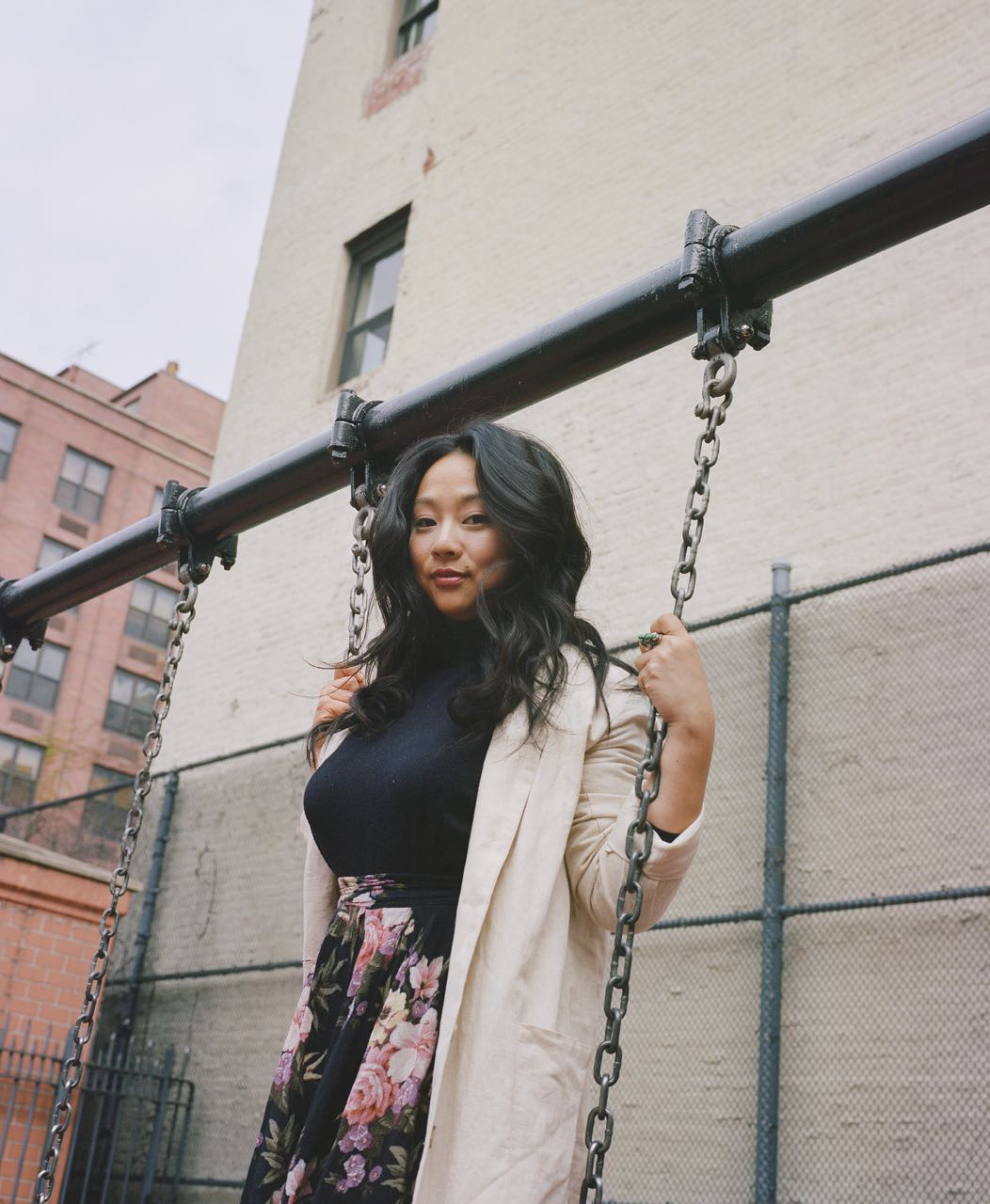
April 23rd, 2019
Stephanie Hsu trained as an experimental theatre artist and never expected to be on Broadway. But after making her Broadway debut last year as Karen the Computer in SpongeBob SquarePants, she is now starring as Christine Canigula in Be More Chill, a role she helped create at Two River Theater in 2015 and at the Signature Theatre this past summer. Stephanie has imbued the musical’s passionate, seemingly self-actualized heroine, and “totem of truth,” with her own brand of self-described weirdness; she is also cognizant of the opportunity she has been given to set a precedent in creating an unconventional leading lady who is a positive role model for young people. I recently spoke with Stephanie about the similarities and differences between experimental and commercial theatre, what playing Christine has taught her, why she enjoys originating roles, and more.
Your character Christine’s big “I Am” song is called “I Love Play Rehearsal.” What was your experience with theatre like, back when you were in high school?
I started theatre relatively late compared to most people who now are in the business. I was playing basketball when I was in high school, and it wasn’t until the end of my freshman year [that I started theatre]. When I was a freshman, I did the senior play [which the seniors wrote themselves], which was unheard of for any freshman to do, and that was my first ever play. Then, as I went through high school, someone said to me, “Hey, you know you can go to college for this.” I didn’t even know that was a concept. That was not on my radar at all. In performing Christine, I’ve been thinking a lot more about, “What was I like in high school?” In my senior year, I was the president of our drama club, but I was horrible; I was really bad at it. But, definitely, as I got older, I just really started sinking my teeth more into theatre. I don’t think I really realized it. I never was a drama geek. I never was insular in that experience, but, when I look back on high school, I certainly recognize the ways in which theatre had a huge impact in bringing joy and feeling into my life. Actually, one of my favorite productions that we did while I was in high school was a very low-key version of Assassins, which was so unheard of. I remember my favorite performance of that show was one where we had twelve people in the audience. I was like, “This is the theatre. It doesn’t matter how big the audience is. Even if it’s a small house, people can have a very meaningful experience.” So, I guess I’ve always been a little bit of an experimental, devised person in that way.
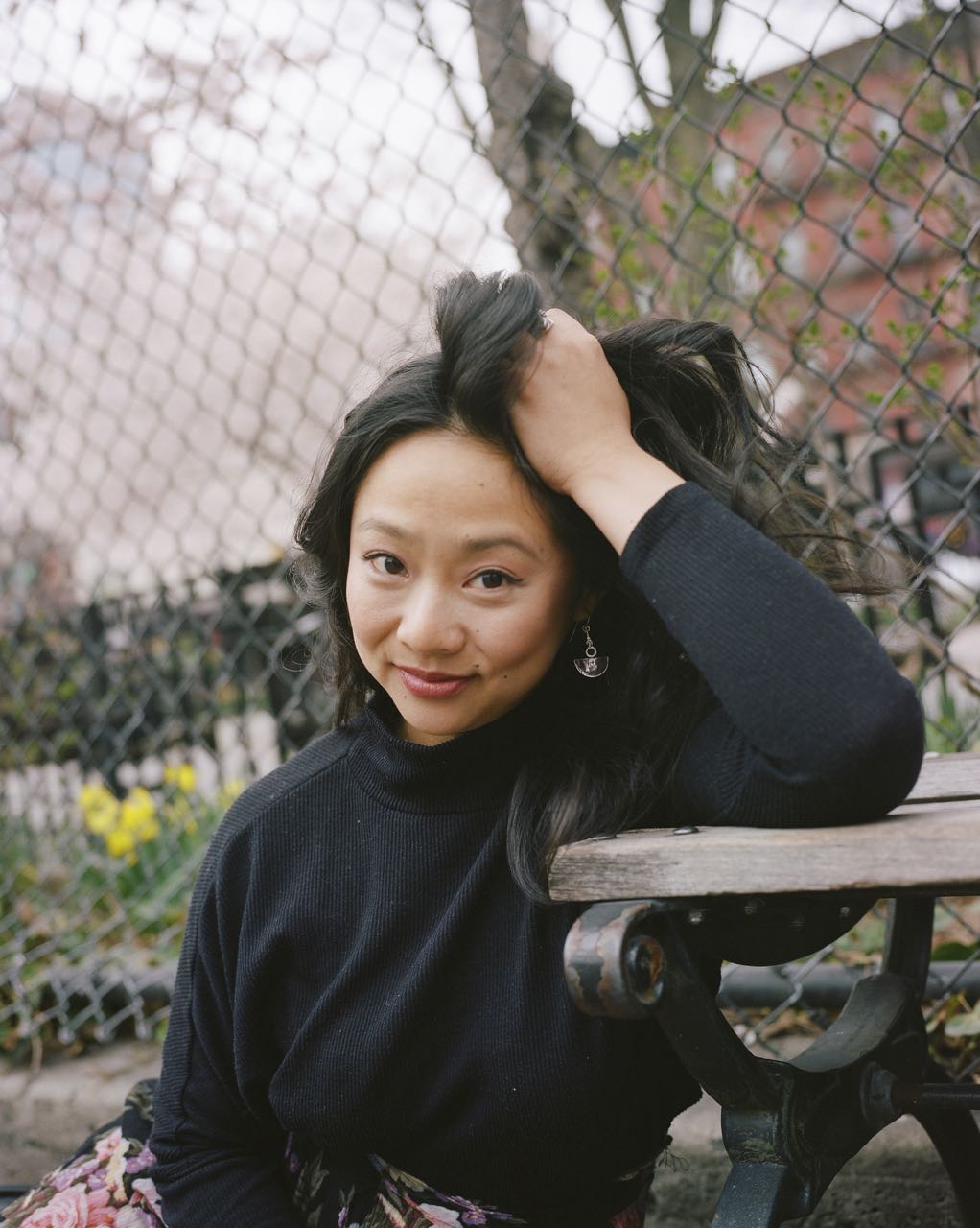
You and I actually have something in common. As teenagers, we both worked with Liz Swados. How did Liz influence you as an artist?
This ring that I’m wearing is a ring that Liz and I got together in Abu Dhabi. I met her when I was in college at NYU. We did this thing called The Reality Show together. Many years ago [roughly 15] now, there was huge slew of suicides that happened at NYU, and the administration just wanted somebody to address and help young people in relationship to mental health and transitioning to New York City and college. They hired Liz to do something similar to Runaways. I saw The Reality Show my freshman year, and I was like, “I don’t know what that is that I just saw, but it’s awesome, and I have to be in it.” So, I worked with her all throughout college. Now, in the community, we say we’re Liz kids, basically, the same way that [La MaMa founder] Ellen Stewart was Mama, Liz is also Mama in a lot of ways. People don’t realize it, but Shaina Taub, Grace McLean, me, Jo Lampert, so many people who are rising in the community are Liz kids. I definitely take great pride in that.
We worked together a lot, and then when I was finishing up college, I started to choreograph for her, and I co-directed The Reality Show in Shanghai and Abu Dhabi. We traveled the world together. When she passed away, it was the time where I was also starting to do more commercial work, and I got involved with SpongeBob. Over the last few years, we recently had a celebration for her on her birthday, and everybody just went around to tell stories of Liz and celebrate her. I realized that she’s such an important person. I can feel her absence. I never necessarily wanted to be on Broadway, and I think a lot of that has to do with the fact that I was working with Liz. She was so not for corporate theatre. I, through SpongeBob, found a huge benefit, in that commercial theatre tends to be a very accessible way for good messages to get out there, because the chances for someone who is traveling from somewhere else in the country to go to La MaMa is a little bit harder than for someone to go see a Broadway show with their family and grandmother. I was really grateful for the time between Off-Broadway Be More Chill and Broadway Be More Chill because I felt like I got to return home for a little bit. I was helping devise a piece at the Public, and got reconnected to a bunch of vocalists and artists from the experimental world that helped me flood back into the cloth that I was cut from. I think it’s really helped me and informed me in this chapter of Be More Chill just to remember what I think is the point of theatre, which is an act of service. Also, my particular wheelhouse and my artistry is not something that is really conventional. I didn’t go to musical theatre conservatory. I studied with Liz Swados, and did experimental theatre, and went to acting school, and did a lot of stuff in the comedy world. To be able to allow that to be a part of myself, and bring that to Broadway, is something that I’m really grateful for, and for the time to get to drop in and own for myself.
It’s interesting to me what you were saying about the commercial theatre reaching more people. You were involved in My Depression, the HBO movie that Liz created about her experience with depression, which is probably one of the more mainstream ways in which Liz got her message across.
The beautiful thing about TV and film is that anyone can access it. You can be wherever you are in the world, and watch something from your computer, or even your phone now, and that’s really powerful. What I love about that is that people can reach it. Broadway can sometimes be very far away. But also, this Broadway season is so thrilling to me, and the fact that we’re here and also What the Constitution Means To Me, Hadestown, Oklahoma, it’s like downtown. It feels awesome that so many new voices are on Broadway, because it means that we’re hearing and we’re receiving different kinds of art. It’s not just like we’re walking into a theatre and receiving what you always receive. I think that’s important in terms of variation and challenging us to better understand what we want to continue to make.
Do you ever feel like you’ve had to fight against being boxed into doing a certain type of role or certain type of theatre?
I think I was always drawn to downtown theatre and experimental theatre, because I felt like those stereotypes did not exist. I’m so grateful. I will always want to roll around the floor with my friends and devise theatre. If there was a living there, I could do that all day. I’ve been really fortunate that the doors that have opened for me in the commercial world, have not asked me to change myself, and the type of collaboration that I bring to the table. I think that that type of stereotyping and pigeonholing no matter who you are or where you come from definitely still exists in commercial theatre, but I do think it’s changing. I do recognize that our show is special in that. Christine Canigula did not have to be me; she happens to be me, and that’s part of making space. And also, what’s so beautiful is that when I first did SpongeBob—I was involved with it from the very beginning—but so much of Tina [Landau]’s collaborative process is based on Viewpoints, Mary Overlie, Anne Bogart, the SITI Company. But Mary Overlie, who is the person who created Viewpoints, taught at ETW [the Experimental Theatre Wing at NYU]. So I was lucky that my first experience of what it might mean to be on Broadway was still cut from a very downtown [cloth]. People have said to me, “Oh, now you’ve originated two Broadway roles,” and in my head I’m like, “Oh yeah, I guess I have.” But we’re always creating, so things should always be new. I do think that, as I get older, I recognize that my special skill is probably not going to be fitting into a mold, and that’s okay. If that job is not my job and someone is amazing at that, that’s great. I’d so much rather create something new and offer that.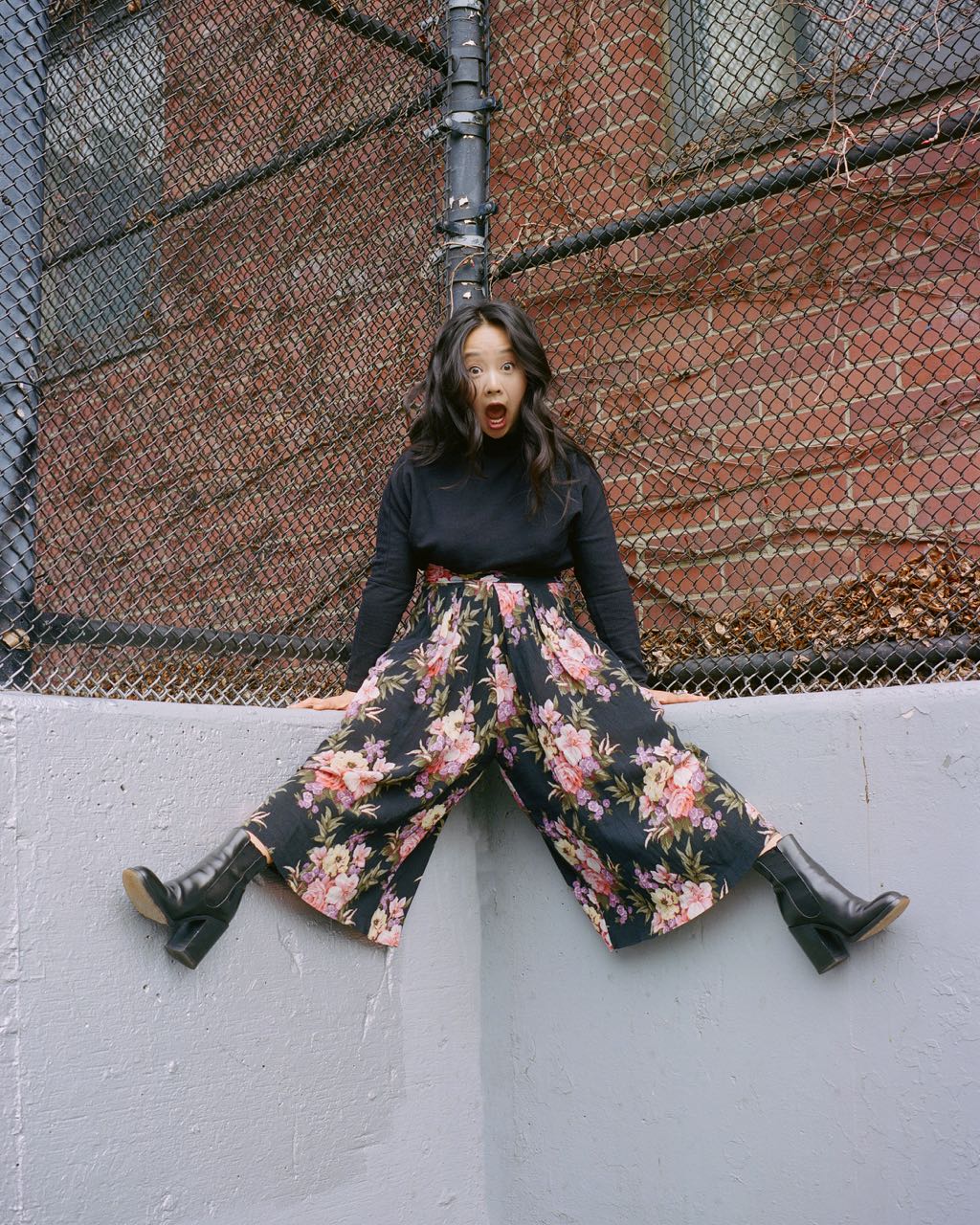
Both Karen in SpongeBob and Christine in Be More Chill seem to have very intentional, specific movements and body language. How much is physicality part of your approach to creating new characters?
That’s something that Liz taught me. Liz was the first person who opened up the articulation of, “You use your body. You really love using your body and you need to continue to use your body.” So she gave me a lot of space to explore physicality, and then I also trained in Grotowski, which is physical-based and it’s like how one gesture might evolve into character. But I can also stand still, and it just so happens that the two characters I’ve been playing are a computer and a young teenage girl who loves theatre. You can watch TV and film all day and watch people stand still, but I think that part of my subliminal liberation tactic is to embody and empower people to do things with their body that we can’t do with our everyday life. We go to the theatre because we want to feel shaken. Britton Smith, who plays Jake, the popular kid in Be More Chill, he discovered this recently too. But a few years ago, I discovered this Israeli dance movement called “gaga,” and it’s all about following pleasure. I love cobbling together different forms of experimenting, and implanting it into my performance. Because originating a role is one thing, and then having to do that eight times a week and keeping it fresh is something else. So, play is a huge part of that.
You originated Christine at Two River Theater. Then you went off and made your Broadway debut in SpongeBob, and then you returned to the role of Christine. Did your experience in SpongeBob teach you anything that you were then able to bring to Be More Chill 2.0 and 3.0?
Absolutely. Broadway is so hard; people can’t talk about it enough. I think no one can teach you how difficult Broadway is until you just have an experience of it. The stamina, the discipline, the lifestyle changes that you make in order to maintain your body and emotional, physical, spiritual health, to do a Broadway show, it’s so hard. I feel so grateful that all the lessons I learned from how to do that and how to build that as part of my practice as a Broadway actor. I was able to experience SpongeBob with a smaller role, so that I could do Be More Chill and feel like I’ve already got one under my belt, so nothing comes as a surprise. We had Good Morning America two days after we opened; it was like a 5am call time. Some of our debuters were like “This is crazy.” I’m like, “Oh no, this is Broadway.” You think you open and then it stops and it actually doesn’t, it just gets crazier. So to be able to experience it and laugh at it, as opposed to have a shock to your system, has been really helpful. And everyone’s a pro. I think everyone really holds their own. We play young people, and I think there’s a lot of like, “Oh, they’re young,” and it’s like, “We’re not that young.” Everyone’s an adult and has been in the business for a little bit. All of us are really supportive of one another, and so there’s an aspect of like, “Hey, maybe you should get a massage. Are you taking care of yourself? Do you want to go home and rest?” Everyone’s really good about just checking in. I think we’re all caring for each other the best that we can.
When I spoke with Jen Tepper a couple of weeks ago, she talked about the family vibe that has been created with [composer] Joe Iconis’ musicals, and especially with Be More Chill.
Yeah, it feels apparent in the rehearsal room, and now, of course, in the performance, that there’s just a lot of love there. I think that the reason why this show has still been so fun to do eight times a week is because the root of it is love and joy and play. He [Joe Iconis] and [director] Stephen Brackett and [book writer] Joe Tracz gave everyone such agency to really do their thing, and so it’s been really nice to step away and feel like, “We’re just doing this thing that we all collectively agreed to create.” Of course, there were people who were guiding us, and helping to shape and sculpt the piece, but we also all brought what we have to offer to the table. So, we can really take full ownership; it’s been really joyful and freeing, which I definitely know is not always the case.
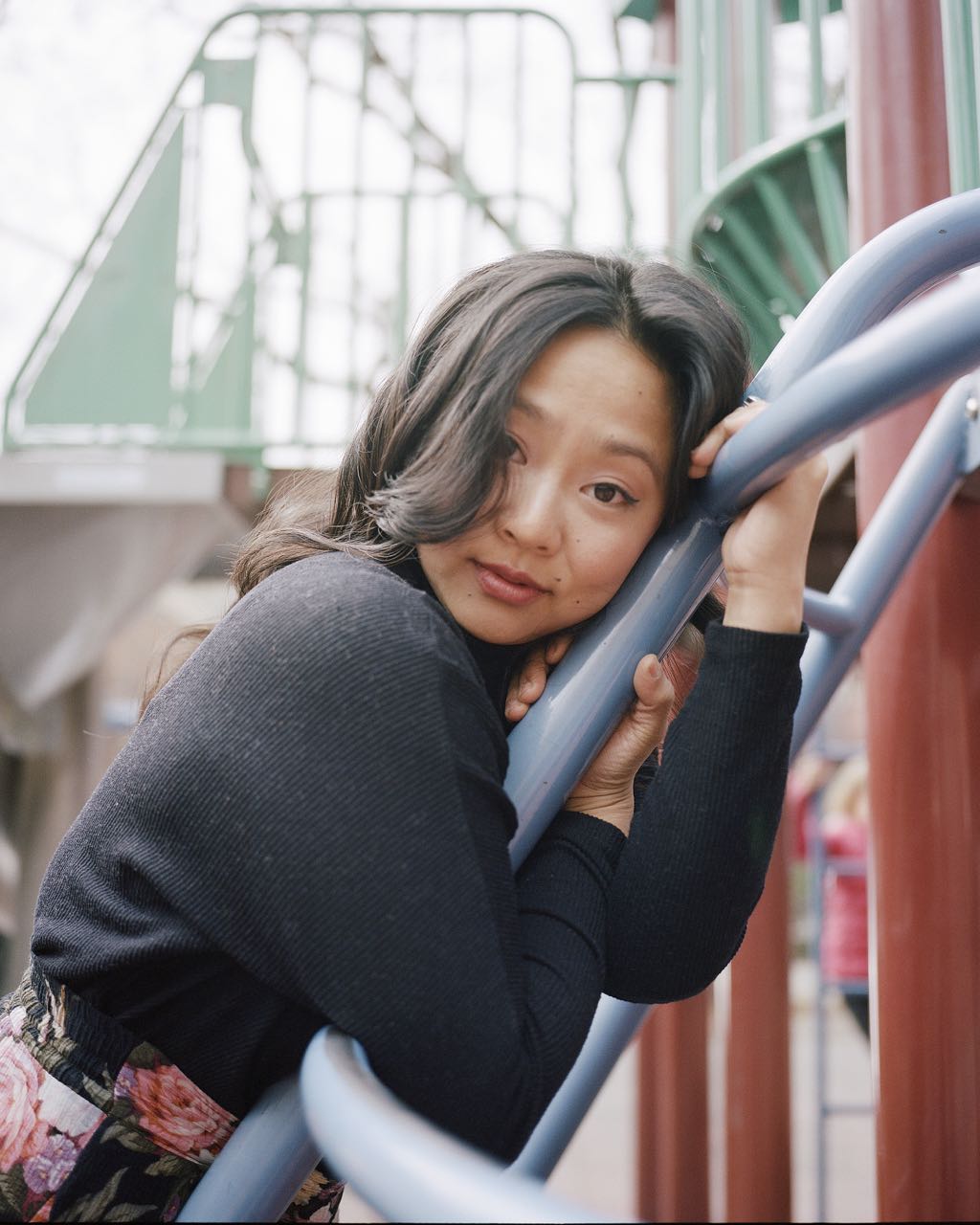
I’m sure you’ve been asked a lot about how you’ve shaped and impacted and informed Christine, so I want to ask you the inverse instead. How has Christine impacted you? Have you learned anything from the character of Christine?
One thing she has definitely taught me is that people have great capacity for change, and that you may think that your ideas, or your perceptions of what you want for society, are crazy, but it’s actually very powerful. I feel that because she has really obviously very passionate text, and many young people are so drawn to those specific aspects of her. There was a fan who drew a picture of Christine, and she had a stack of feminist literature in the fan art. When we did this at Two River, that was not in my head. That’s not what I was understanding about her. Having that reflected back has really helped us dig even deeper into her opinions. I think, also, one of my favorite moments in the show is the end, “Voices in my Head.” As you get older, for the most part, you have a better handle on the voices in your head. She has a line where she says, “It’s embarrassing; I found out that deep down, I just want things to be easy.” There’s definitely that aspect of me, too, also pertaining to the unknowns of the world. Maybe I would want a Squip [a supercomputer that implants in people’s brains and makes them more popular]. Maybe I would want someone to just make all those difficult feelings go away. But she so adamantly moves through them with a consciousness, even though she’s a hypothetical character and a young person. Being able to say those words every night is such a helpful check-in for myself; there are some things that I do not know, and that’s okay, and how can I acknowledge that and continue to move through the world with truth and courage and uncertainty, and so much love and joy, you know? I’ve been really loving their love story recently. It’s been really sweet. I think about a younger version of myself, and the love stories I was watching, and I was like, “Oh, this is not like that,” for many reasons. I’ve been loving falling love with Will Roland, it’s so nice.
It’s nice to see a female love interest who isn’t the damsel in distress.
Totally. There was a mother who came to the show and she was like, “People think that Jeremy’s the hero, but Christine’s the hero. She doesn’t budge.” I felt so affirmed. I was like, “Oh, I’m glad that people are experiencing that aspect of the story, too.” I mean, all of the characters come of age and have their own growth. We talked about it a lot during rehearsal. How can we make sure that she is the totem of truth, so that as everyone is spiraling out, she can clearly be streamlining through her objectives and intentions? It’s something that Brackett and I talked a lot about, and that has deepened for 3.0, even between 2.0 and 3.0. We had this conversation where I was like, “I just want to make sure that these shoes that we’re creating are ones that we would be proud that other people can fill.” Because when I leave, this will just be paper. How can we make sure that these words are empowering young people who are going to be playing Christine to be saying words that actually have value, and further strengthen themselves as artists and individuals? When you are an actor, there are roles that can liberate you, and there are also roles that can perpetuate a trap. And I was really, really hoping that we would create a Christine that would be a space of freedom, as opposed to her having to say ideology that is going to further perpetuate a type of young female lead in a way that is not helpful for the society that we’re trying to build.
I went to see Be More Chill on Broadway with my niece who’s in middle school. Afterwards, we talked a lot about Christine’s autonomy and the decisions she makes throughout the course of the show, in terms of the Squip, and the romantic relationships with Jake and Jeremy, respectively.
To me, what Jake represents is when you’re young, and you’re like, “Wait, the guy that I’d never be into, is the guy that I’m kind of into. We’re in different leagues, or we’re from different worlds, and you are interested in me? Okay, I’m going to try this out.” There is empowerment in making a choice, and being like, “Do I want to try something new?” Part of living a life is making mistakes, or going to one extreme, and realizing that you have a boundary there, and so you have to learn how to course correct. The thing I love about “Voices in my Head” is Christine says, “Just say what’s on your mind,” and Jeremy says, “Bowling alley performance art, just the two of us.” And Christine sings, “And any voices in our head?” And Jeremy says, “There might be voices in our heads, but I swear the voices there will be the regular kind.” To me, that is such a simple moment of “Listen, I don’t know what comes next,” but what I perceive from Will Roland every night is, “I don’t know what’s going to happen next, but I’m telling you that I am entering in it honestly, in my uncertainty, and that the doubts and the way that I navigate my doubts, it will be from a place of goodness.” So in that regard, I do really believe that she chooses not to take a Squip, she accidentally drinks it from the beaker. So, for sure, for sure don’t drink a Squip. And I think that what’s special about their love story is that they choose to enter into it from a place of truth and honesty and goodness. That’s the totem, that’s the gauge. Do you have goodness in your heart? And I don’t know what this chapter will be for us romantically, but maybe we should try. Life is so scary and full of so many unknowns. It’s easy to talk about Be More Chill like, “Young people, they don’t know.” But I have voices in my head all the time. I’m constantly being like, “Should I date this person? I don’t know.” We all do.
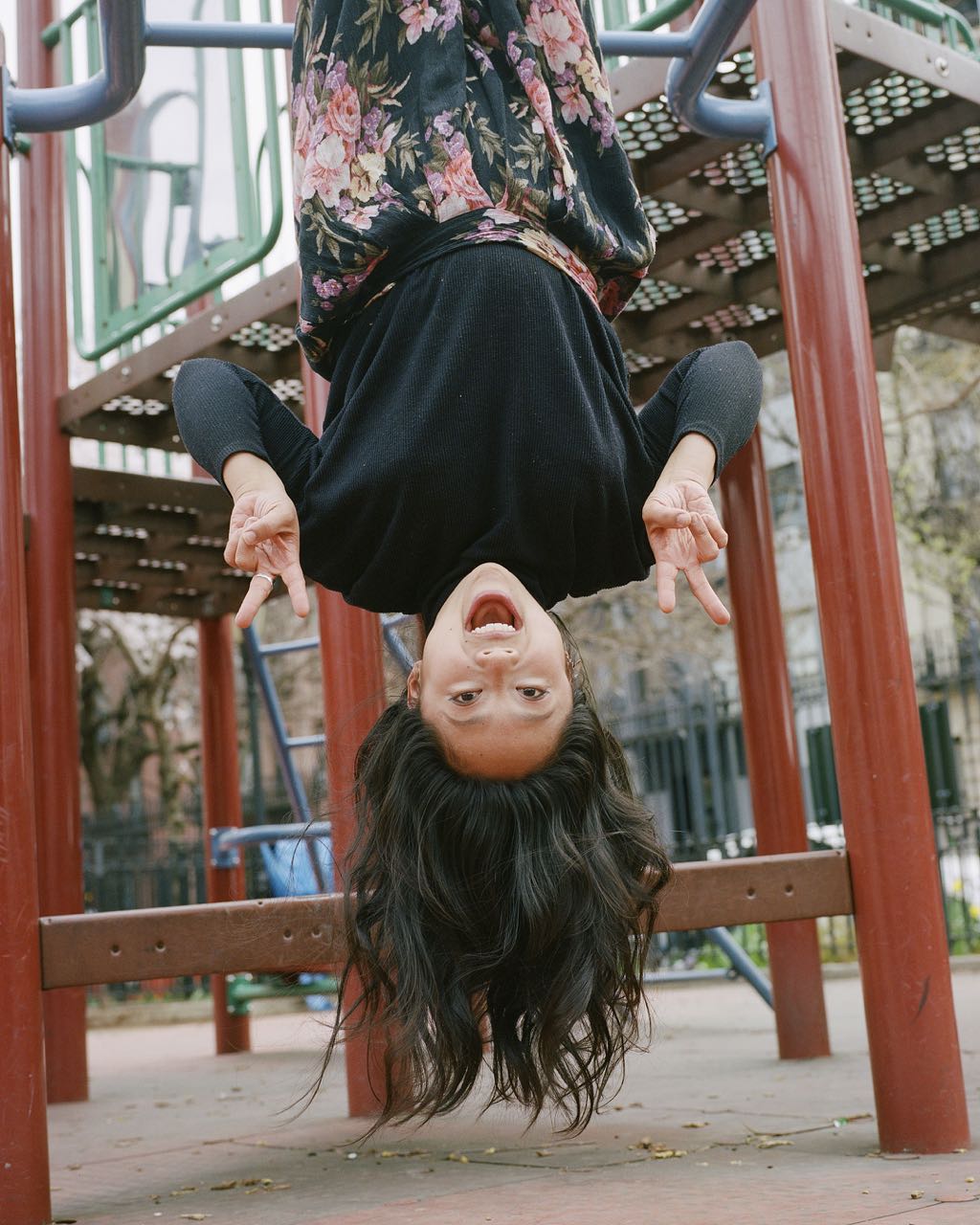
You’ve spoken before about wanting to “weird the world,” wanting people to be comfortable with the uncomfortable. Could you elaborate on what you mean by that?
Well, what comes to mind is when I go to weddings, or when I go to dance parties, and I look at people and their fear of dancing, unless they have a drink in their hand. I’m like, “This is insane. This is so crazy. Why are we afraid to celebrate, why are we afraid to take full ownership of every dimension and sphere of our bodies?” And in relationship to social justice circles that I’m inside of and liberation work, I remember when I was younger, all I wanted to do was change the world. I did not know what that meant, but I would look at my history book and I would get so sad because I felt like it would be impossible to change the world. I am just me, and all the history I’m reading about feels so far away from me. My desire is to empower people and individuals to understand that they have an incredible capacity for change. You are not a two dimensional person. When we stand together, if we’re at the march, if we’re at the theatre, when thousands of people are walking together, there is no law. I think we, in contemporary society, have been, in many ways, disempowered from the full agency that we have as individuals and as a collective. So for me, weirdness is like a puncture to breaking some of these shells that have encased us to teach us that we have to act a certain way, when actually, when we stretch those boundaries, our hearts, our physical selves, our intellectual selves become way more expansive than we were told we were allowed. So, I like to say weird because it sounds funny, and it’s a little bit more digestible, but underneath that my desire is to invite people to celebrate and expand every dimension of themselves so that their voices can be heard.

